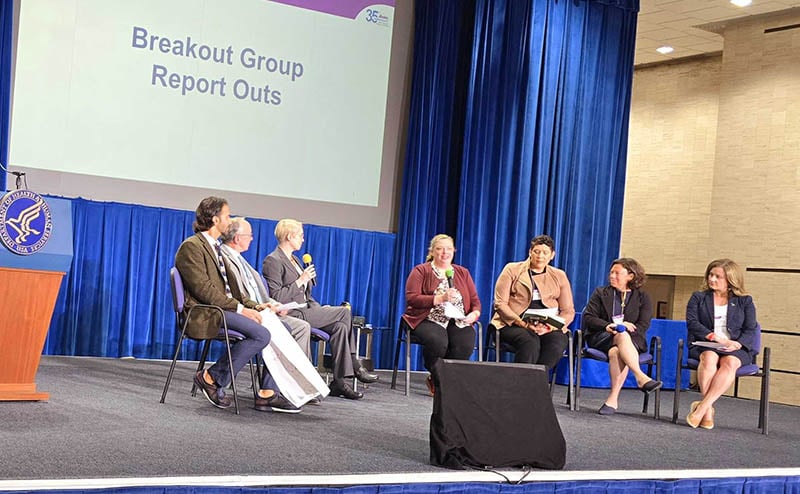View a recording of the livestream: Part 1 Part 2
Today’s Agency for Healthcare Research and Quality (AHRQ) Summit to Address Emergency Department Boarding brought together patients, emergency physicians, emergency nurses, hospital leaders and others for some tough talk about boarding, a national public health crisis. ACEP advocacy helped make it all possible.
|
How did we get here?
|
ACEP members were well represented on the stage and prominent in the audience. Featured speakers included:
- Ula Hwang, MD, MPH, FACEP, professor of emergency medicine and population health, medical director of geriatric emergency medicine, New York University Grossman School of Medicine, past member of the ACEP GEDA Board of Directors
- Brandon Morshedi, MD, DPT, NREMT-P, FACEP, FAEMS, emergency medicine & EMS physician, University of Arkansas for Medical Sciences; Global Medical Response
- Brendan Carr, MD, MA, MS, chief executive officer, professor and Kenneth L. Davis, MD, distinguished chair, Mount Sinai Health System, and 2024 winner of ACEP’s Colin C. Rorrie, Jr., PhD award for excellence in health policy
- Gabe Kelen, MD, FRCP(C), FACEP, chair of ACEP's board of directors, professor and chair, Department of Emergency Medicine, Johns Hopkins University
- Peter Viccellio, MD, FACEP, professor and vice chairman, Department of Emergency Medicine, associate chief medical officer, Stony Brook University Renaissance School of Medicine, ACEP Councillor
- Jesse M. Pines, MD, MBA, MSCE, chief innovation officer, US Acute Care Solutions and 2023 winner of ACEP’s Colin C. Rorrie, Jr., PhD award for excellence in health policy
The message from emergency physicians was loud and clear: boarding is a public health crisis and the best way to address the root causes is through a systemwide, collaborative effort.
Physician-led discussions highlighted the impact of this crisis while confronting misconceptions about its causes. Dr. Kelen and others clarified that boarding does not occur because of low-acuity patients.
“I’m sorry, I don’t want to hear it. Low-acuity patients have nothing to do with boarding,” he said.
Dr. Viccellio discussed how hospitals can adjust the way they work. “These solutions do not require that people work harder. They require that people work differently,” he said.
One way ACEP is creating a path for progress is by strengthening regulatory requirements for hospitals related to boarding.
“Twenty years of data associates boarding with worse outcomes,” said Dr. Pines. “Boarding is a fixable problem, but the incentives aren’t there to fix it. It takes leadership, time, energy, and sustainability.”
Emergency physician leadership will be a critical part of any meaningful solution and ACEP is making sure your voice is heard.
“This community is not a bunch of emergency physicians pounding their fists on the table,” said Dr. Carr. “These are folks that can see the failed social policy and the chinks in the armor of the health care system and can help you to find not a magical silver bullet – there is not one – but a matrixed number of incentives and structural changes and transparency that can get us to a place where we have a health care system that we are proud of.”
What’s next?
ACEP advocacy will continue creating and advancing legislative and regulatory solutions that address this crisis. AHRQ has committed to publishing an actionable report in the coming months.
ACEP is proud to make these important conversations happen, ensuring that emergency physicians have a strong voice and a seat at the table for discussions that impact your practice and patients.
Related:





